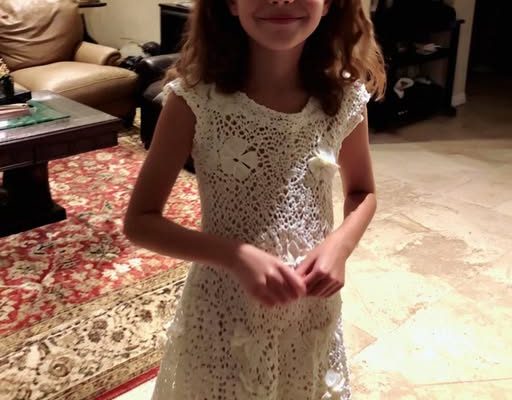Love after heartbreak made me careful. It also made me hopeful. When my first marriage fell apart, Lucy was five, all elbows and glitter stickers, whispering, “It’s our cozy castle now,” as we moved into a cramped apartment. She’s always been my anchor—fierce, bright, older than her years in all the ways that count.
Then Ryan arrived, kind and steady. On their first meeting he pushed Lucy on the swings and asked serious questions about her “rainbow dragon” art project like she was a curator at the Met. Later, ice cream smeared on her chin, she said, “He doesn’t talk to me like I’m a baby.” That was the moment I knew we might actually get a second chance at family.
When he proposed, Lucy practically levitated. She’d helped pick the ring—“secret mission”—and when I told her she’d be my maid of honor, her eyes went moon-wide. “Like a grown-up lady?” Exactly like that.
I’ve crocheted since I was fifteen—something I learned when anxiety made my hands jitter; rhythm and loop and breath until the world quieted. For Lucy’s dress, I hunted three craft stores for the exact pale lilac that felt like a sigh, then sketched a high neckline, bell sleeves (because fairies), and a scalloped hem that would flutter down the aisle. Every night after she fell asleep, I worked by lamplight, stitching love into fabric one loop at a time.
The only cloud on my horizon was Denise—Ryan’s mother—who had an opinion about everything and delivered each one in that syrupy, martyred tone people reserve for “I’m only saying this because I care.” My venue was wrong (not a church), my guest list too small (her “circle” would be disappointed), my casual reception “improper” (etiquette book circa 1987). I swallowed a hundred retorts and told myself she’d come around.
Four days before the wedding, I finally let Lucy try on the finished dress. It fit like it already knew her. She twirled in front of the mirror, lilac skirt rippling like water. “I look like a fairy princess maid!” I managed not to cry and told her the truth: she was perfect.
We hung the dress in a garment bag in my closet. She peeked at it every day, “just to make sure it’s still there.”
The morning before the wedding, I was flipping pancakes when a scream split the house. I sprinted to my room to find Lucy on the floor, shaking, holding a limp heap of lilac yarn. The dress wasn’t torn. It had been unraveled—meticulously, from the neckline down—hours of work undone stitch by deliberate stitch. Someone had sat in our home and erased it.
“Mom… it’s gone,” she sobbed.
I knew. In the way you always know. Denise—the woman who’d called the dress “homemade” like it was an insult—who’d pushed and prodded and corrected as if my wedding were her performance review.
Ryan found us on the carpet in a drift of yarn, Lucy asleep from crying, my eyes raw. “What happened?” he asked.
“Your mother happened,” I said.He started to protest, then saw the precision of the ruin and went pale. “You think…?”
“I’m going to ask.”
I called. Denise answered like she was expecting a brunch invitation. When I told her, she sighed. “I didn’t think it was appropriate. A homemade dress at a wedding? This isn’t a school play.”“You did this to a ten-year-old,” I said, trying to keep the ice in my voice from cracking.
“I made a difficult decision,” she said. “Flower girl would be more suitable for her age. I thought, once it was done, you’d see reason.”
I hung up. Then I called our photographer, who had taken sweet progress shots during fittings. Then my friend Mia, who runs a big wedding inspo page. That night I posted three photos: Lucy twirling in the finished dress; the dress on its hanger; the pile of yarn on my floor. My caption was simple: I crocheted my daughter’s Maid of Honor dress. She twirled in it two days ago. Today we found it unraveled. My future MIL didn’t approve. You can’t undo love this way.
By midnight it had hundreds of shares. By morning, thousands.
The wedding day dawned gray. I’d stayed up all night crocheting a simpler dress, an armor of loops and determination. Denise arrived in head-to-toe white—dress, jacket, shoes—as if she planned to marry her own son. People stared. Small towns travel fast; so do viral posts.
She cornered me while I was getting ready. “How dare you humiliate me,” she hissed. “That post made me a laughingstock.”
“You did that,” I said, meeting her eyes in the mirror. “I just told the truth.”
“You had no right to air family business.”
“Family doesn’t destroy a child’s dress out of spite.”
“I was trying to help.”“You were trying to control.”
Ryan appeared in the doorway, face set. “Mom, you need to leave.”
“Excuse me?”
“You’re not welcome at the reception. You don’t get to hurt my daughter and then sit for cake.”
“She’s not even—”
Denise left, radiant with fury.
Lucy carried my bouquet down the aisle in her new dress like she’d been born to it. People stood and clapped for her—my brave, magical girl. “Still magical?” she whispered.
“The most,” I said.
We said our vows without drama. Love filled up all the space her cruelty had tried to take.
At the reception, Mia grabbed my arm. “Your post is still blowing up,” she said. “People are asking if you take commissions.”
I laughed because I hadn’t slept. “Commissions? I just wanted justice.”
“Looks like you got both. Check your phone.”
My inbox was flooded: mothers, grandmothers, aunties asking for dresses “made with that kind of love.” I cried in the bathroom—not from sadness this time, but from the warmth of strangers stitching a safety net under us.
Six months later, my little shop keeps me busier than I’ve ever been. I donate ten percent to children’s charities. Lucy helps me pick colors and pack orders, folding tissue like it’s silk. “This one’s going to make someone really happy,” she says, patting a lavender bundle. “Because you made it with love. Like mine.”
As for Denise, karma didn’t miss. Her church circle quietly asked her to step down from leadership. Around town she’s “the woman who unraveled the little girl’s dress.” She calls Ryan occasionally; he lets most calls go. When he answers, he keeps it short. Boundaries, at last, in full sentences.
In the grocery store last week, a woman stopped me. “You’re the crochet mom,” she said. “My daughter saw your story and asked me to teach her. She wants to make something beautiful.” I went home and told Ryan. He asked if I had regrets about going public.
I looked at Lucy asleep under a drift of yarn swatches and sketch paper, and at the stack of orders waiting for our morning coffee. “Not one,” I said. Some battles you fight because the win changes more than your own life; it changes the weather around you.
I never forgave Denise. Forgiveness is not a participation ribbon. But I didn’t need revenge either. I needed to protect my daughter and tell the truth. The rest took care of itself.
Here’s what I learned: you can’t unravel love. You can tug and pull and try to control, but real love rethreads itself. Sometimes it even turns into a hundred new dresses, all heading out into the world, each stitch a quiet promise: I was made with care. I was made to be worn with joy.



